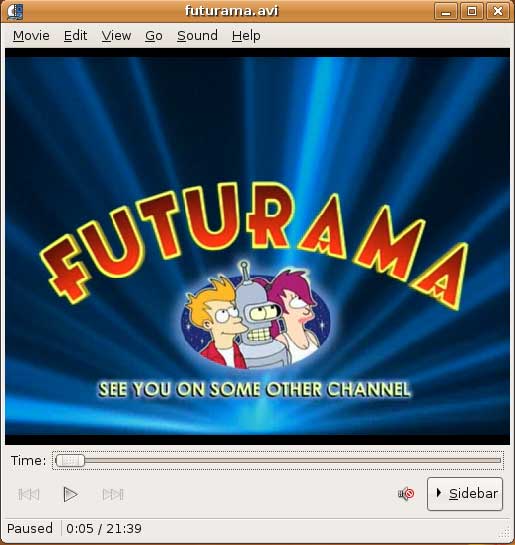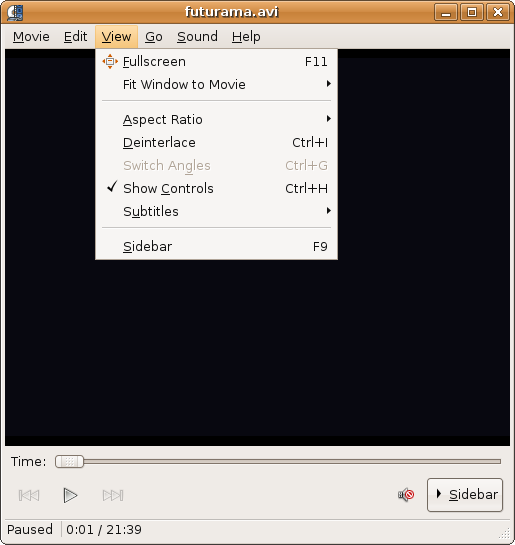Revisiting Linux Part 1: A Look at Ubuntu 8.04
by Ryan Smith on August 26, 2009 12:00 AM EST- Posted in
- Linux
Applications: Video Playback
Windows Default: Windows Media Player
What I use: Media Player Classic – Home Cinema
Ubuntu Default: Totem (Used: VLC)
Moving on to video, we have Totem, Ubuntu’s other media player. As we previously mentioned it’s already the default for audio files opened via the file browser, and along with that it’s also Ubuntu’s only video player. In concept it’s close to VLC or Media Player Classic, as it’s a solitary program that has a single window to play whatever the currently opened file is.
The single biggest strength of Totem is that once the restricted codec pack is installed, it can play anything and everything under the sun. MP3, AAC, MKV, H.264, MPEG-4 ASP, FLAC, and more are all available. This makes both Mac OS X and Windows Vista pale in comparison – the former can play about half of that, the latter even less. Codec hell has always been a nuisance under Windows and Mac OS X, but Ubuntu gets things right and avoids it altogether. I really can’t overstate this; from a fresh install it’s much, much easier to play media out of the box with Totem on Ubuntu than it is any other OS. This is the experience everyone else should be shooting for.

The key to Totem’s ease of use stems from the fact that the restricted codec pack includes the FFmpeg project’s libavcodec library of audio/video codecs. As the project seeks to offer playback support for every significant codec in existence, this gives Totem a clear advantage over Windows and Mac OS X, neither of which use libavcodec. This does mean, however, that Totem is not unique. Its playback abilities can be found in any other application that implements libavcodec, such as Media Player Classic, MPlayer, VLC, and others. As such the real magic is that Totem is the only default media player to include these abilities, rather than that it’s a completely superior media player.
As it stands there are two big kinks in Totem. The first of which is that it’s an extremely simple media player that lacks any kind of advanced features. It offers a single deinterlacing mode, no control over post-processing, and no audio/video filters. As such advanced users are going to find it unsatisfactory, and accordingly it’s one of the only default Ubuntu programs I specifically replaced when using Ubuntu. Instead I ended up using VLC, which has the advanced features I was looking for and I was already familiar with it since it’s a cross-platform media player.

The other kink in Totem is that it’s only as good as libavcodec, which in turn is only as good as the version of libavcodec that came with Hardy due to Ubuntu’s software update policy. As it stands the version of libavcodec that comes with Hardy has issues playing back a small number of Windows Media Video files, something which newer versions correct.
Furthermore it suffers from libavcodec’s continuing weakness: H.264 playback. Only the single-threaded H.264 decoder is considered stable, as such all libavcodec players using it will run in to problems when decoding high bitrate material. Our 30Mbps test clip won’t play back correctly under Totem or VLC 1.01, for example. There is a multithreaded H.264 decoder available in libavcodec, but as it’s not stable (on players that I have that include it, it crashes from time to time) it’s not suitable for general distribution. All of this is compounded by the fact that there’s no other H.264 decoder that can be installed on Ubuntu (e.g. CoreAVC) which means Ubuntu is limited to the best that libavcodec can do. For this reason none of the regular Ubuntu media players are well suited for material such as full quality BluRay rips.
Now we have yet to touch on hardware accelerated playback, which is something we’re going to hold off on until we take a look at Ubuntu 9.04. Linux does not have a common media framework like Windows and Mac OS X have DirectShow/DXVA and QuickTime respectively. Rather the desktop environment that Ubuntu is based off of (GNOME) includes a lesser framework called GStreamer, which is closer to a basic collection of codecs and an interface to them. As such hardware accelerated playback is not as easy to do under Ubuntu as it is under Windows and Mac OS X. We’ll take look at the APIs and the software for this in our look at Ubuntu 9.04.
But so long as you don’t need hardware accelerated playback, then Totem or another libavcodec based player will do the job nicely. Compared to the other applications in Ubuntu, I would put Totem/VLC up there with Firefox in terms of being a jewel of the OS. Like Firefox they may not be OS-exclusive applications that can be used to drive users towards Ubuntu, but they help solidify Ubuntu by giving it the ability to do a common task just as well as (or better than) any other operating system. At least until Windows 7 hits the shelves, no one has a better default media player.
Final Verdict: Meets My Needs










195 Comments
View All Comments
Guspaz - Wednesday, August 26, 2009 - link
"Not that it would necessarily be of much use, the last time I saw any statistics for instant messaging network usage, the vast majority of North American users were on AOL’s AIM network."IM use is highly regionalized. As such, AIM is clearly the dominant IM in the USA. However, Canada is dominated by MSN Messenger, and has been for many years (most of us migrated from ICQ to MSN around the release of Windows XP, I believe, due to the bundling of then Windows Messenger).
So, if Canada is dominated by MSN, while I can't speak for Mexico, it's misleading to claim that "the vast majority of North American users". As a Canadian, I can't think of anybody I know in person that uses AIM. They all use MSN or Google Talk without exception.
Aclough - Wednesday, August 26, 2009 - link
For myself, the thing that most bugs me when I have to go back to Windows is all the missing features from the window manager. I've come to rely on having multiple workspaces on my desktop, but I can adjust to having just one fairly easily when I'm not working on a lot of different stuff at once. What really bugs me, though, is how much more effort it takes to move or resize windows in Windows. On Linux I can press ALT and then click anywhere on the window, but with Windows I have to carefully click the title bar or the very edge of the window and that takes a noticeably longer time once you're used to doing things differently.Oh, and I find that the Linux scheduler seems to be noticeably better than the Windows one in preserving responsiveness when the system is under load.
fumacapena - Wednesday, August 26, 2009 - link
Great article!How about some benchmarks of "minimal" distros (like Puppy, Tine Core, ...)??
I like the idea of "ressurect" an old PC, but I would like to see benchmarks in Quad Cores, i7 too!
Anandtech is great, Bench(beta) is awesome!!
(sorry by bad english)
Thanks
InGraphite - Wednesday, August 26, 2009 - link
A few months ago most major trackers unbanned Transmission, but it still doesn't seem to be universally accepted on private trackers.I remember offhand (I could be wrong) that the main gripe was due to the fact it made excessive queries and thus flooded trackers with requests, or had the ability to.
chomlee - Wednesday, August 26, 2009 - link
I think you really need to mention the big picture here.I myself just tried Ubuntu for the first time 2 months ago and although I will admit that I have spent up to 8 hours trying to figure out how to install a specific program (before I found out there was a way to get the package manager to find the install), and I wanted to smash my computer at times. Now that I have learned quite a bit more, I realized that the few things I have installed worked great and flawlessly.
Anyhow back to the big picture. I can understand some of your concerns with how the OS will work with specific programs but what I have found is that most people I know use their computers for 2 things email and web browsing. Most of these people are constantly having problems with the system running too slow and cant seem to get rid of hidden viruses/malware. So I think that those people could easily be much happier with a simple OS like Ubuntu just for email and web browsing (And I would get a heck of alot of less calls from my dad asking my why his computer is running too slow). Lets also not forget that everything is moving to be browser compatible (like you mentioned).
Also, for people like myself, I use my Ubuntu system for a file server as well as a media center (XBMC is Awesome).
So, yes, for burning DVDs/CDs/Playing Games/Microsoft Office, I see no reason why you wouldn't use windows, but I think 95% of the users would be perfectly fine with ubuntu which is something that Mr Bill would not be very happy about when the public realizes this.
Keno - Thursday, August 27, 2009 - link
I think you have missed one small but important part.I am Ubuntu user since 8.04. I came to Linux because of the constant treat of viruses.
Last month I have installed 7 and it is very user friendly and I think it is very user frinedly but after Avira Antivir got crashed by virus I installed Kaspersky INternet security 2010. then it took almost twice as long to boot. Then I gladly returned to Ubuntu 9.04. Because MIcrosoft can not exist without Antivirus I think you should do some real benchmarking and test windows WITH Antivirus.
On Ubuntu I have ClamWin just in case i get some files from Windows users:)
Thanks
ioannis - Wednesday, August 26, 2009 - link
just wanted to point out that you can install software under the LiveCD. Of course it does not install on the hard drive. It remains on a ram-drive, so when you reboot, it's gone. It's still useful, if you wish to test out some package or perform some task with a tool not installed by default on the LiveCDstrikeback03 - Wednesday, August 26, 2009 - link
Even more useful (and not mentioned) is that Ubuntu can easily run off a flash drive, and more recent versions even include a GUI tool for installing it to one. Then all installs and other changes are saved from session to session, and everything runs much more quickly than the LiveCD.Mr Pearce - Wednesday, August 26, 2009 - link
It would be great if you could do more articles on compiler and especially driver performance differences. That was the most interesting part of this article.Ryan Smith - Wednesday, August 26, 2009 - link
This is what Part 2 will look at. I can compile some stuff by hand to see if it closes the Windows/Ubuntu gap, and I have plenty of video cards on hand to test what I can when it comes to graphics.